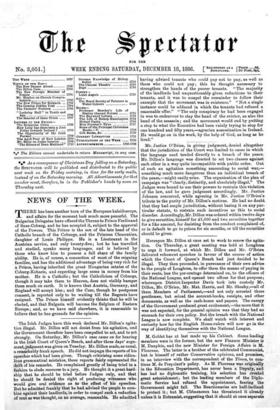Mr. Justice O'Brien, in giving judgment, denied altogether that the
jurisdiction of the Court was limited to cases in which the language used tended directly to a breach of the peace. Mr. Dillon's language was directed to set two classes against each other in a way quite incompatible with public order. Out of such an agitation something amounting to social war,— something much more dangerous than an individual breach of the peace,—might easily arise. The organisation of the plan of campaign was "clearly, distinctly, and absolutely illegal." The Judges were bound to use their powers to restrain this violation of the law, and he gave judgment accordingly. Mr. Justice Johnson concurred, while agreeing in Mr. Justice O'Brien's tribute to the purity of Mr. Dillon's motives. He had no doubt that they had ample jurisdiction, without basing it on any par- ticular statute, to restrain such incentives as this to social disorder. Accordingly, Mr. Dillon was ordered within twelve days to give securities, himself for £1,000 and two securities together for a like amount, for desisting from the conduct complained of, or in default to go to prison for six months, or till the securities should be given.










































